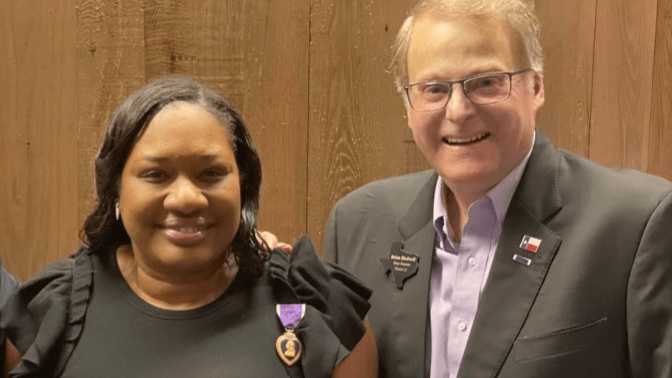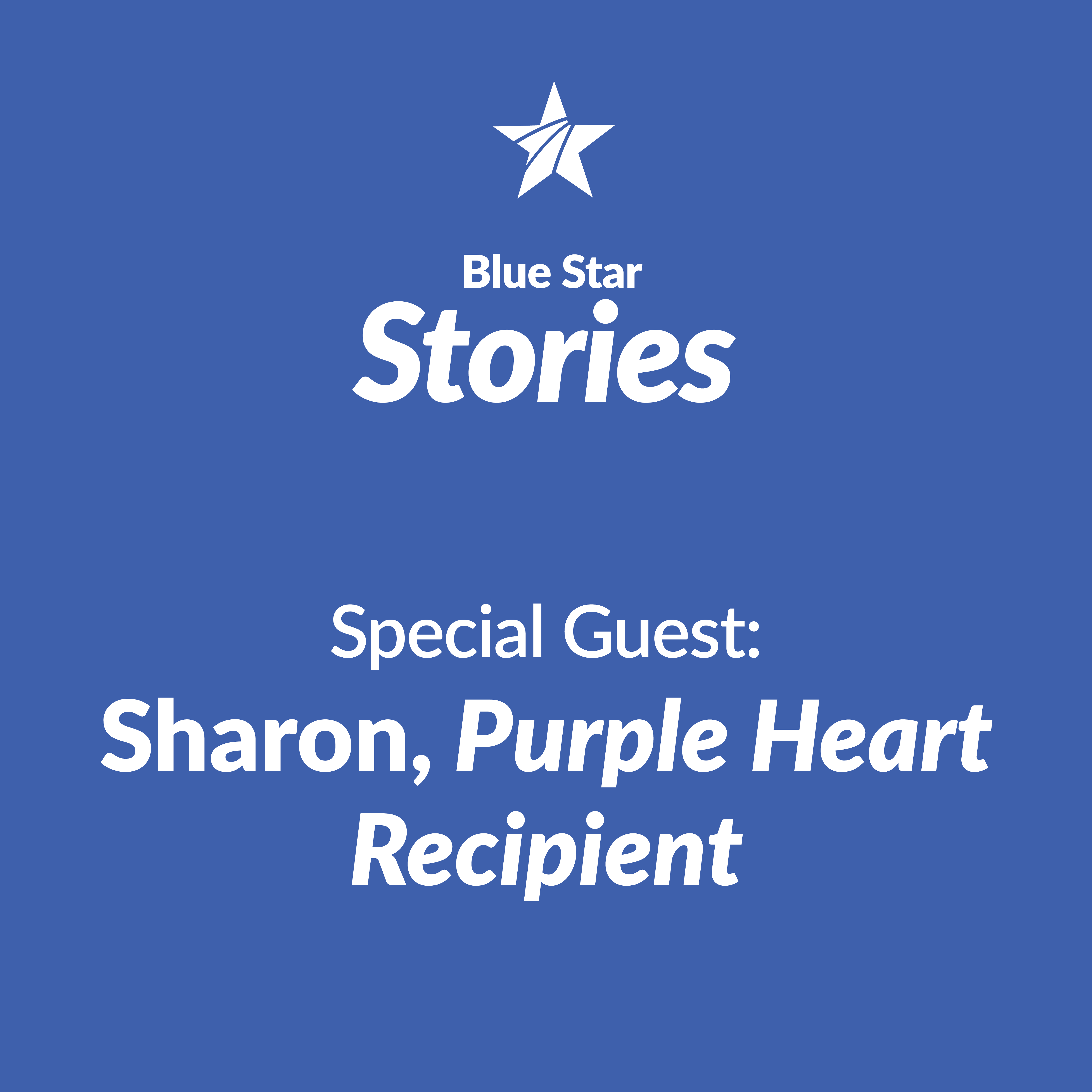Healing Wounds with Support: A Purple Heart Story

"Six months later, I woke up in Germany, not knowing who my parents were because of the extent of injuries that I endured. So, I was out in Germany for a year going through at least 33 surgeries, and at that time, I was told I wouldn't be able to have any children. Then moving forward, going to Walter Reed, going through more surgeries…" - Sharon, Purple Heart Recipient

The Department of Defense estimated some 50,000 soldiers were injured during the wars that followed the tragic events of September 11th, 2001. While those subsequent wars in Iraq and Afghanistan are over, many post-9/11 Veterans continue to carry battle scars and even a Purple Heart.
The Purple Heart is one declaration of distinguished honor our country extends to those wounded or killed while serving in the U.S. Armed Forces. A statement by the Congressional Research Service reads, "The wars in Iraq and Afghanistan have greatly increased the number of servicemembers receiving the Purple Heart award, as well as the potential conditions under which they receive the award. Increasingly acknowledged conditions, such as traumatic brain injuries (TBI) and post-traumatic stress disorder (PTSD), as well as accidents and other events while deployed, bring up new questions as to when a servicemember deserves a Purple Heart."
By 2017, there were 35,438 Purple Heart recipients from the war in Iraq and 21,939 from Afghanistan. Sharon is one of those recipients. And this is her story.
A Future in the Service
Across the nation, many felt the call to military service following the attacks of 9/11. One of those people was Sharon from Sullivan County, NY, who joined in 2006 alongside her best friend. Leaving college and apprehensive parents behind, she grew up in rank, becoming a warrant officer by 2010. That year would forever change her life.
While on a routine mission during her second deployment to Kalzu, Iraq, Sharon's convoy was attacked. "I was able to save my gunner, the soldier who was in front of me, and then the other one who was inside on the other side of me," Sharon recalls. "But not knowing the extent of injuries I had because of the adrenaline rush, I still was able to find a way to get out and pull them out of the vehicle."
Months later, she woke up in a German hospital after having suffered significant injuries to her head and body. After a year of rehabilitation, 33 surgeries, a transfer to Walter Reed National Military Medical Center, and a reassignment to Fort Benning, GA, Sharon's service continued. She found herself on orders to Korea quickly after returning to active duty, where she would experience the unexpected: pregnancy.
"He was a blessing," Sharon shares. "He was such a miracle baby. I was put on bedrest, but towards the end of March, I was taken off of bedrest because there was an inspection I had to help with, being charged with the motor pool things. As such, two weeks later, I had Yerik at 23 weeks."
However, Sharon would go on to face yet another unimaginable experience: the loss of a child. At just seven months old, Yerik passed away.
Transformed by Trauma
Sharon's story, at the core, echoes that of many post-9/11 Veterans. She suffers both physical and mental injuries. The U.S. Department of Veterans Affairs reports that around 11-20 out of every 100 Veterans from Operations Iraqi Freedom (OIF) and Enduring Freedom (OEF) have PTSD in a given year. Finding assistance for such ailments is challenging, especially after transitioning out of service. "I still go through my own issues with PTSD and my traumatic brain injury," Sharon says. "Without my family, I don't know how [I] would make it."
At Blue Star Families, we've learned from the 2021 Military Family Lifestyle Survey that transitioning service members are facing a loss of sense of purpose/camaraderie, community connectivity, and more. That's why one of our organization's primary goals is to help Veterans find a greater sense of belonging where they live so they and their families can thrive.
Sharon is an example of how trauma can be transformed into strength when a Veteran feels supported. Upon being discharged in 2016, she leaned on the support of her family and community to create change, founding the Yerik Israel Tony (YIT) Foundation, named in honor of her son.
"We started helping out mothers with preemies, with transportation, housing, medical bills, getting things ready for their baby to come home, and making sure the nursery is already taken care of," Sharon shares. "If they need home health aid, it is taken care of. We started helping with half of daycare."
YIT assists Veteran, National Guard, and Reserve families with premature babies by obtaining formula, diapers, and continuing to support them if their preemie also has a long-term disability. And after noticing a pervasive issue in her hometown, Sharon quickly added Veteran homelessness to YIT's outreach.
"We start[ed] seeing the homelessness with Veterans, which 'homeless' should not be in front of 'Veteran," Sharon points out. "So we started helping housing homeless Veterans, not just house them but help them get life insurance, ask them to plot where they wan[t] [to] be laid to rest at, so they can have the proper sendoff and burial before even moving them into their apartments."
Building a Community of Support
YIT is one of many organizations operating to support the nation's Veterans. Today, its reach extends into Maryland. It was there seven years ago that they created a group home, housing six Veterans at a time, providing food, clothing, furniture, and burial when they pass away. Sharon hopes to mirror that opportunity throughout New York.
When asked, she attributes the growth of YIT to the support she receives in the military and civilian community. "There was a mother who couldn't find a certain formula, but we had it supplied to her and lo and behold, she's a therapist with her own practice and she does pro bono work for us," Sharon shares. "We are very open even in the community to where there's not a 'no.' Where there's a will, there's a way for us to help. And thanks to Blue Star Families for the book donations, we are able to have a mommy & me group, a daddy & me group, for those who suffer from PTSD and loss of connection to their children. Reading is essential and to see that bond come back, and then have that same therapist be there and to watch and give tips and ideas on how they could connect back with their children, is amazing."
Sharon's story reinforces why our research on the experiences of military and Veteran families, and programs like Blue Star Welcome Week, are essential. Together, we are building stronger communities. If you're a Veteran in need of support, please visit our Resources page.
